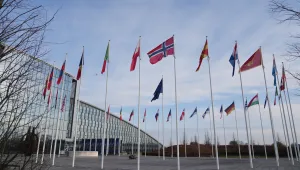Note
A Hebrew-language version of the op-ed appeared in Haaretz on July 27, 2015. The translation was provided by the author.
Israel's classic defense doctrine was a huge success. Not only has Israel survived, which was not self-evident, but it has become secure, stable, and prosperous. In many ways, our security situation has never been better.
Many can recite the three basic elements of the classic defense doctrine — detection, deterrence, and decisive defeat — but few remember that it had additional components, as well. At the military level, it spoke of transferring the battle to enemy territory and of waging short wars. At the strategic level, it spoke of maintaining a strong relationship with at least one leading world power and of waging war only with its support, while nevertheless maintaining Israel's freedom of maneuver. At the diplomatic level, it viewed the pursuit of peace as a fundamental aspiration. It also stressed the importance of optimal mobilization of our national resources for purposes of defense, while building up the nation and ensuring a clear Jewish majority.
Israel's strategic environment has changed greatly ever since the classic defense doctrine was formulated. The Arab states are coming apart and the primary threat they pose today stems from their weakness, not strength. A stable peace with Egypt has prevailed for nearly forty years. The Eastern Front no longer exists and the IDF's primary threat, the Syrian army, has been decimated. Iraq has crumbled and Jordan, with which Israel has been at peace for twenty years and maintains strong defense cooperation, serves as a buffer before threats from the east.
The inter-state conflict with the Arabs, which was the primary component of the Arab-Israeli conflict, has ended, and the conflict is limited today to the Palestinians and non-state actors. No hostile superpower exists today, and the United States, with whom Israel has a strong alliance, will continue to lead the international community, even if it has been weakened somewhat. A number of countries maintain special relationships with Israel and various Arab and Moslem countries would be happy to improve relations with us, once progress is achieved on the Palestinian issue. The old assumption of a "nation dwelling alone" is no longer relevant.
The nature of the military threats Israel faces has also changed. The threat of invasion and of battles between conventional armies has disappeared. The non-conventional threats have diminished significantly with the destruction of Syria's chemical weapons, while the deal with Iran, its downsides notwithstanding, has postponed the nuclear threat by a decade. In other words, Israel will not face an existential threat for at least a decade — in fact, we will not have faced an existential threat ever since the peace with Egypt, together a period of 50 years. Important threats remain, first and foremost Hezbollah and Hamas, and probably ISIS, but they do not pose an existential threat or a threat to Israel's territorial integrity. The two greatest threats Israel faces today, delegitimization and demography, are not even military in nature. The wars today have largely become a matter of choice.
Israeli society has also changed. It is far more diverse, but also divided. The national consensus has partly unraveled, the defense burden is no longer shared equitably and casualty aversion has grown. As a liberal western society, the motivation of some social groups to bear the defense burden has diminished, especially when Israel is engaged in endless operations to suppress terrorism and there is no diplomatic horizon. Social changes such as these have had major ramifications, for example, heightened casualty aversion imposed constraints on the choice of military options in all of the rounds of fighting with Hezbollah and Hamas.
When a nation's strategic environment, military threats, and society undergo fundamental change, it is time for a fundamental change in its national security doctrine. It is ths surprising that while the threats are increasingly disappearing, the defense budget continues to grow and a substantive change in the national security doctrine has yet to take place. The following are just some of the changes needed.
Israel must reach a diplomatic outcome to the conflict with the Palestinians that will prevent a demographic catastrophe and an end to the Zionist dream. This is not a political statement, and the Palestinians are not easy partners, but a strategic imperative. An agreement, even international understanding that Israel is trying to reach an agreement, will lead to a dramatic change in our diplomatic and military standing.
Greater emphasis must be placed in military budgets and thinking on defense. Much like other militaries that have faced popular insurgencies and guerrilla warfare, the IDF has had a difficult time achieving decisive victory and even long term deterrence. Wars are only won through offense and offense must remain at the heart of IDF strategy. We have not decisively beaten Hezbollah or Hamas, however, in any of the rounds since the 1980s, and this has had a deleterious impact on Israeli deterrence. When repeated operations do not achieve their objectives, it behooves us to display greater caution in deciding to make use of force. We should do so only when we are truly prepared militarily, enjoy international or at least American legitimacy, the objectives are clear and the public is willing to pay the price.
Israel must develop the capability to show even greater stoicism and self-restraint. The claim that we have to respond to almost every incident in order to maintain deterrence remains to be proved, indeed, our deterrence has been harmed by the lack of success achieved in the recent operations even more. Terrorism and rocket fire are "unacceptable," but in practice we do not respond to every incident, and it turns out that they are acceptable. A courageous leadership would tell the public that we will have to continue living with the Hezbollah and Hamas threats, that a comprehensive response does not yet exist, and that we must show stoicism and restraint.
In the absence of an effective offensive response, the IDF must internalize the concept of defense. Investments in defensive systems such as the Iron Dome, may prove more beneficial than additional advanced combat aircraft and submarines, the need for which is unclear given the changes that have taken place in Israel's strategic environment and military threats.
Israel must adapt its policy to that of the United States. It is hard to overstate the importance of our relations with the United States, indeed, it is unclear whether Israel can even survive today without the United States. Israel has received over $120 billion in U.S. aid to date. Without U.S. aid, the IDF would be an empty shell, and Israel would be vulnerable to diplomatic warfare and delegitimization efforts. We must conduct a policy which leaves us with some freedom of maneuver, while aligning ourselves with the United States and even seeking a defense treaty.
Paradoxically, the most important change of all may lie in reform of Israel's electoral system. Recurrent early elections and the consequent need for far-reaching coalition compromises prevent the formulation of a coherent national security strategy.
Statements and views expressed in this commentary are solely those of the author and do not imply endorsement by Harvard University, the Harvard Kennedy School, or the Belfer Center for Science and International Affairs.
Freilich, Chuck. "Only the Defense Strategy Remains Unchanged." Belfer Center for Science and International Affairs, Harvard Kennedy School, August 4, 2015.





